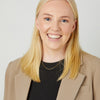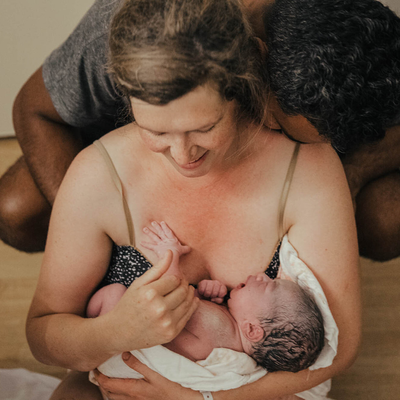
Country life sounds quite idyllic, doesn’t it? Vast open spaces, quiet nights, both animals and humans living off the surrounding land. That is until you experience pregnancy. For so many living rurally, this phase of life is met with inadequate pre and post natal support, and being excluded from the opportunity to create meaningful relationships with other mums on the journey to parenthood. Just to name two factors.
We connected with the incredible Stephanie, Founder and CEO of Motherland, a not-for-profit organisation that's on a mission to eliminate the crippling isolation so many rural mums face. And this is her story about raising littlies on the land…
Introduce yourself! Tell us a little about who you are, what you do, your favourite snack, your lifelong hero.
I’m Stephanie Trethewey and I’m a former TV journalist who accidentally fell in love with a farmer after interviewing him on a slow news day! In July 2019, we swapped city life for country life, leaving Melbourne and moving to Tasmania with our six month old boy, Elliot. Fast forward a couple of years and we now have two kids, Elliot is nearly four, and my daughter Evie is two. I’m the founder and CEO of Motherland, a not-for-profit and a charity that I created during my early struggles as a rural mum.
When it comes to eating, I’m not a big snacker. I love big meals and I often crave anything with an Asian flavour which I am dearly missing as UberEATS and access to different cuisines and fancy restaurants is a thing of the past out here!
I don’t have one hero, I have many people in my life who have influenced and mentored me, however from a business perspective I love Richard Branson, particularly his motto “screw it, let’s do it”. This helped fuel Motherland as I am very much a ‘build the bike while you ride it’ type person, and I love the lean startup methodology of experiment, failing, and pivoting as you grow your business.
Motherhood is a life altering experience; how do you recount pregnancy and birth with both your two children, Elliot and Evie?
I was very lucky with my pregnancies with Elliot and Evie. Both were textbook, but the two births were chalk and cheese. Elliot was born in Melbourne and while I wouldn’t call it traumatic, it was very long and painful. I didn’t trust my body. I was so fixated on getting the baby out rather than focusing on what my body was capable of during his labour. With Evie I had a totally different experience, a waterbirth which was the most empowering moment of my life. It really changed my view of birthing and helped me build confidence as a mum. I did suffer the loss of a pregnancy between Elliot and Evie which was absolutely soul-destroying, and I felt very unsupported by our healthcare system here in Tasmania throughout that traumatic time.
How was your postpartum recovery impacted by living regionally?
I had Elliot while we were living in Melbourne where the support and access to services was great. I had problems with breastfeeding early on but with the click of a button I had a lactation consultant at our house to help me. I ended up successfully breastfeeding him for 14 months.
With Evie, I was lucky that we didn’t have any issues feeding and my physical recovery after my water birth was amazing. However my mental health took a big hit in those first few months post-birth. I was dealing with a toddler and a baby, plus the pressures of farm life. Add to that the fact my husband couldn’t be around a lot because we were just setting up the farm. He went back to work 24 hours after Evie was born and I found myself feeling very isolated.
I wanted to speak to a counsellor, so I proactively saw my GP to obtain a mental health care plan. However, I was then told it would be a 2 month wait for an appointment with a counsellor who only visits town once a fortnight. When I turned up for my appointment, I was met with a “Sorry darl, we booked you into podiatry instead of psychology by mistake”. I felt really let down and I never went back.
So therein lies a great example of the huge gaping hole in our maternal healthcare system and our healthcare system in general, in regional and rural Australia. We are leaving rural parents behind and the services and support in many cases are just not up to scratch.
Motherland could be considered your third baby, can you tell us more about how and why you started the platform?
I had this moment when Elliot was about 8 months old. He was crawling around the floor next to me, Sam had gone to work on the farm for the day and I was feeling really frustrated and so alone. I just thought “if they say it takes a village to raise a child, then where the hell is mine?”
That’s where the idea for Motherland was born. It started as a podcast which was a great way for journalist Steph to connect with rural mum Steph. I started by interviewing rural mums every week from all around the country. The show has now amassed almost 500,000 downloads and I’ve interviewed more than 150 incredible and inspiring rural mums.
What resources are regional mothers able to access via Motherland?
Motherland’s online community is growing rapidly and so is the podcast but we have excitingly extended our support beyond that. In September 2021 we launched Motherland Village - Australia’s first online rural mother’s group program that connects rural mums to their own personalised support group through a six week facilitated program.
It became abundantly clear to me that I wasn’t the only rural mum who couldn't access a mother’s group. After Evie was born, I did a survey and over 250 rural mums responded. Of those respondents over 50% said they didn’t have access to a mother’s group and 82% said feeling isolated is the hardest part of raising children on the land. The penny dropped and so Motherland Village was born.
How many women are currently involved in Motherland’s virtual village?
Since September 2021, we have connected 140 rural mums to their very own support group. That is 15 virtual villages and mums from across 7 different states. Some beautiful friendships have formed and it’s been an incredibly rewarding way to offer a service that previously did not exist for the many rural mums who either are geographically isolated or for other reasons are socially isolated living in a rural area.
One of the best moments so far was being lucky enough to witness one of the Motherland Village groups first meeting in person. There were tears of joy. It just solidified that what I’m doing is so important and special. We are making a real difference to the lives of rural mums raising kids on the land.
There’s quite a team behind you now (exciting!), and you’ve very recently been named the 2022 AgriFutures Rural Women’s Award winner (congrats!), what can we expect from Motherland in the near future?
Winning the award was an absolute game changer! Coming from a place where I felt like a square peg in a round hole, it has been life changing for me in gaining confidence as a rural woman and finding my place.
The team is growing. Earlier this year, I was able to secure an incredible board for Motherland, including industry experts and specialists in mental health and emotional wellbeing. We are also now a registered charity and not-for-profit, which I’m really proud about.
Our mission is to grow and scale Motherland so that no rural mum is left behind. We are actively seeking partners, both corporate and government, to help build Motherland’s sustainable future. We have so much to offer and have lots of exciting things we want to do to further support mothers living on the land all around the country, so watch this space!
Motherland enrolments are currently open (March intake) for mums with 4-10yr olds. Head to www.motherlandaustralia.com.au/motherland-village/ to browse the available packages and match with other like-minded rural mums.




Comments